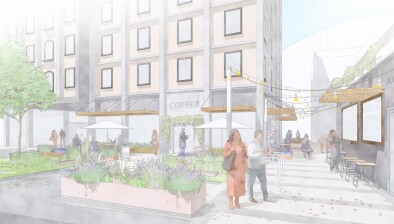Homeless mapping project aims to end postcode lottery for service provision
Significant gaps in the provision of services for the homeless in Dundee have been revealed in a new report published by researchers from the University of Dundee.

A report produced by the Smile4Life programme, developed by a team of researchers from the University’s Dental Health Services Research Unit (DHSRU), suggests that support services in the city are unequally focused upon crisis periods rather than prevention or early-intervention initiatives and follow-up services.
The three-year Reflexive Mapping Exercise, which involved the identification of 135 frontline services available to those who find themselves homeless in Dundee, also found that a geographical disparity of the services in the city.
Dr Andrea Rodriquez, the lead researcher on the project, said: “This publication is more than a list of services but the result of a multi-agency collaboration between different sectors. We collected information from a diverse set of services and they all wish give their best in their fields, but how to work better together and make a real difference? How we can be more aware of what is available and help each other to talk and do things together? We hope the mapping tool can help to achieve this.
“It’s clear that support for those experiencing homelessness or at risk of becoming homeless are more concentrated away from areas of high social deprivation. This can reduce access and users’ ability to attend health and social care appointments, which does not help them get out of the cycle.
“Our reflexive mapping research aims to put a line in the sand and map out the services available to the homeless in Dundee. What we have found is that there is a serious lack of continued care, especially when it comes to follow-up services such as those that might help with tenancy or housing issues. We also identified a clear pattern of unequal distribution in the services which must be looked into.
“We would like to thank Dundee City Council, through the joint work done by the Strategic Commissioning Group for Homelessness, and Shelter Scotland for the partnership towards the creation of a national discussion platform to discuss health and social care integration. We hope that our report will prove useful for future consultation on the location and quality of provisions in the city.”
The Smile4Life programme was funded by the Scottish Government in 2008, when it committed to improve the oral health of homeless people in Scotland, a move instigated by previous research led by the DHSRU at the University of Dundee.
The Dundee team in partnership with the University of Aberdeen are currently finalising a mapping of services in Aberdeen.







